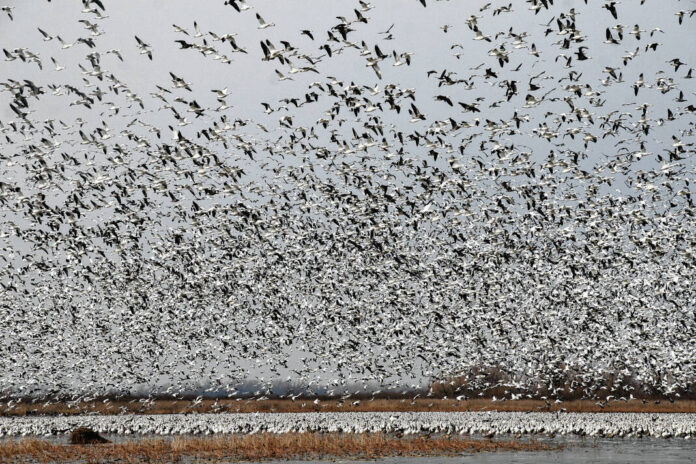We’ve reached the time of year when sportsmen may start going a little stir crazy. There are plenty of options for outdoor enjoyment, but a comfortable couch, warm fire and good ball game on television have a way of keeping us indoors.
It takes strong mental fortitude and real desire to bundle up and beat the cold to venture out into the elements. But when you do, the adventure can be incredible. You have far less company on the water and in the woods.
Ice fishing is a tough activity to beat this time of year, but doesn’t apply to a large portion of the Midwest. You’ll have to head up north for this, but it’s worth the drive. Largemouth bass action is still an option down south on open reservoirs. Central Flyway light geese are still hitting the ground and trappers across the region are collecting pelts. Crappie anglers are taking advantage of the schools on brush piles. Here are a few more suggestions for beating the winter blues:
Iowa: Paddlefish snagging
Paddlefish regulations in Iowa are about as complicated as the worst western draws for bighorn sheep, but the state has an abundance of these prehistoric fish, and each spring anglers pursue them with snagging equipment. The season is open all year on interior waters, but differs on rivers. The Mississippi River and Missouri River both produce paddlefish below numerous dams.
The DNR suggests the Iowa River from Coralville Lake to River Junction and the Cedar River from Cedar Rapids to Moscow. In most of the state, the daily limit is two with a possession limit of four, but there are places where special tags are required. Your best bet is to make sure you read the paddlefish section of the Iowa Fishing Regulations booklet.
Nebraska: Light Goose Conservation Order
The Light Goose Conservation Order (LGCO) is a special season set by the U.S. Fish and Wildlife Service to help reduce the number of light geese because they are causing harm to critical tundra habitat. Killing these birds is harder than most might think. They are hunted about nine months out of the year from Canada to the Gulf of Mexico, so it’s easy to understand how that kind of pressure can make a species tough to kill. Light geese travel in massive flocks, so it stands to reason you need giant spreads of decoys to attract them. Smaller spreads will work, but typically, the more decoys the better.
In Nebraska, the LGCO runs the entire month of March in all zones. Light geese include snow geese, both white and a blue phase birds, and Ross’s geese.
Missouri: Wipers at Thomas Hill
Most lakes in North Missouri are covered with ice in February. Not Thomas Hill. This 4,950-acre reservoir has a warm water discharge from a power plant, making it a year-round, open water fishery. If jigging a tiny rod while staring down a hole isn’t for you, break out your favorite bait caster, tie on a big silver Rat-L-Trap and give your arm a workout hauling in some of the lake’s mean hybrid striped bass, otherwise known as wipers.
According to MDC fisheries biologist Mike Anderson, they stock 49,500 wipers into Thomas Hill each year and the population is very good. He said growth is excellent because of the gizzard shad, with most sampled fish being between 18 and 25 inches. Trophy fish much larger are fairly common, he added. Try the Brush Creek Arm, where in February the water remains between 55 and 63 degrees.
North Dakota: Perch at Devil’s Lake
Addictions can be hard to break. Mine — eating fried lake perch dunked in drawn butter — is hopeless. With the decline of southern Lake Michigan’s perch fishery, I have had to look for new sources of supply. The most exciting I have found is ice fishing Devil’s Lake. This massive 200,000-acre reservoir has become a destination for lake perch ice fishing. The daily limit is 20, but the possession limit is 80 — meaning if all goes right, you and a partner could leave after four days with 320 of the best eating fish filets to be found in the Midwest (at least in my opinion).
Tanner Cherney of the Perch Patrol Team says they have 10 guides with over 200 years of combined ice experience who promise to make the trip fun for the whole family.
“You’re going to catch a lot of perch and our guides will entertain you. They’ll also take the time to teach you how to catch perch through the ice on Devil’s Lake,” Cherney said.
See you down the trail …
Brandon Butler writes a weekly outdoors column for the Daily Journal. For more Driftwood Outdoors, check out the podcast on www.driftwoodoutdoors.com or anywhere podcasts are streamed. Send comments to [email protected].





